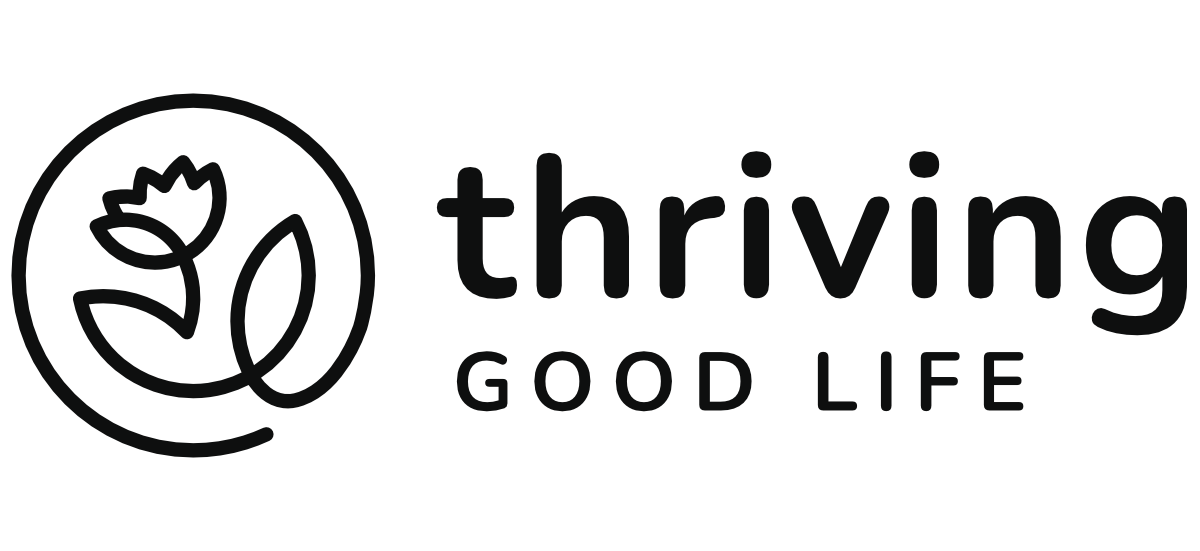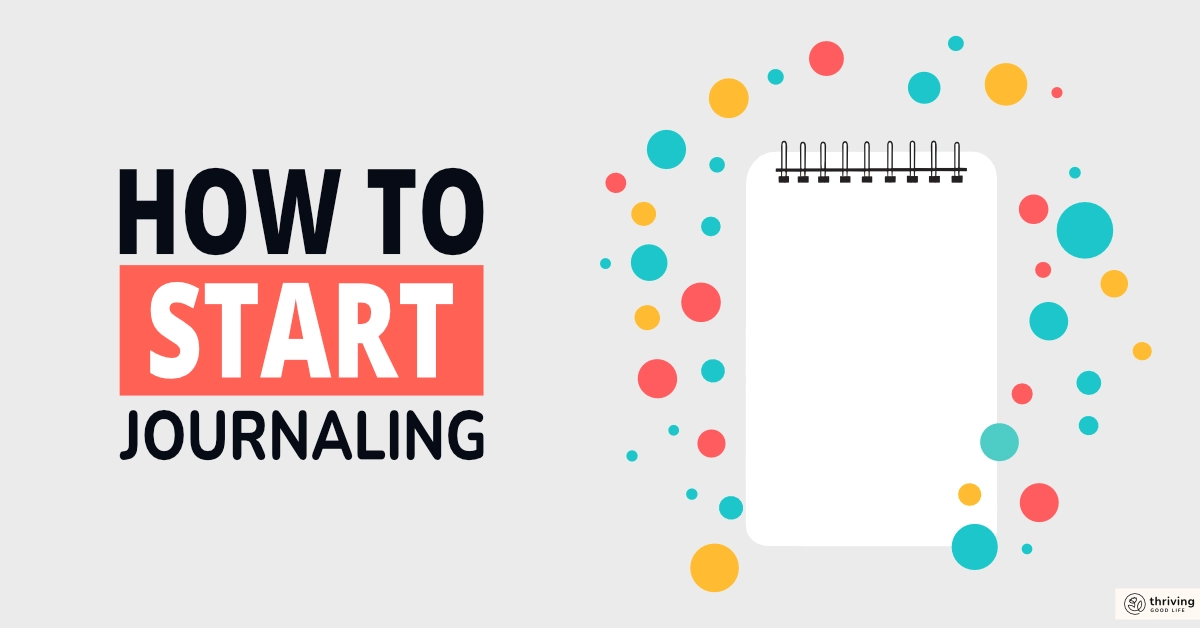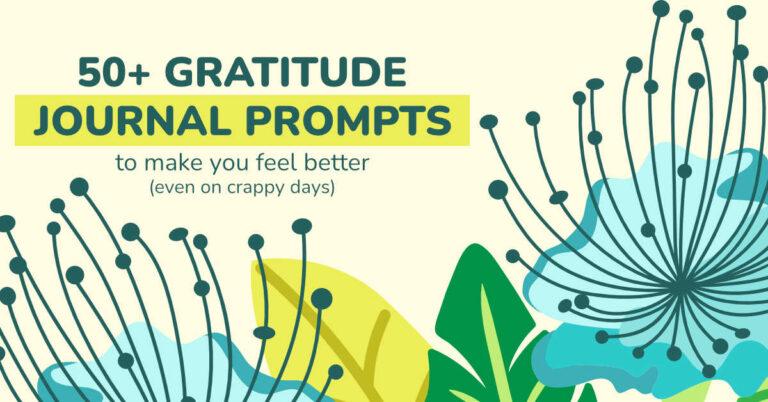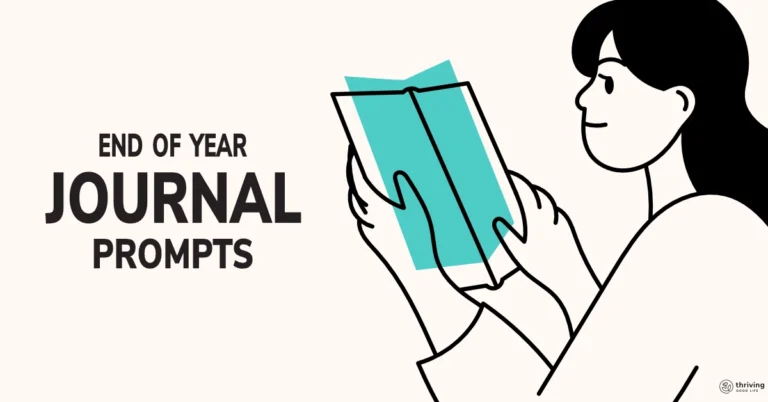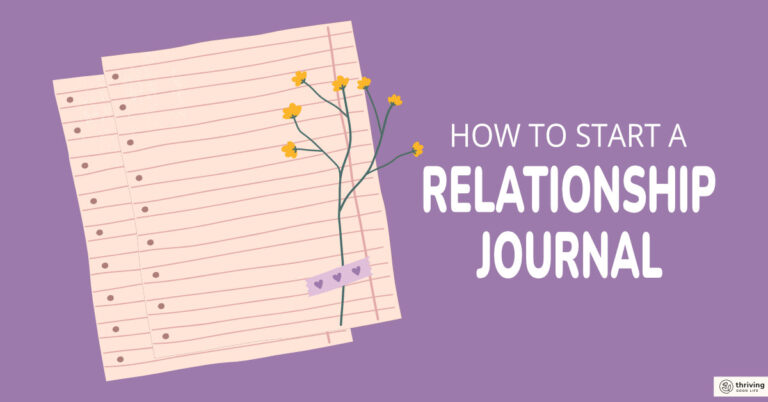🙏🏾 Learn how to make your journaling practice work for you and stay consistent in the process.
So you’re thinking about starting a journal?
Let me just say, that’s one of the best life-improving decisions you’ll ever make.
Okay, so I’m a little biased. I’ve drunk the Kool-aid. What can I tell you.
As a journal loving fangirl I find it hard trying to resist the urge to force encourage my friends and family to pick up their pens.
But I know constant nagging isn’t the answer. So, here I am, pouring my energy into writing this guide to journaling.
It’s a comprehensive and beginner-friendly guide that covers everything from from how to get started, to what to write, and how to keep your journaling practice alive. Plus other useful tips.
Feeling unsure about how to start your journal or how to journal effectively? Let’s baby-step through this process together.
You ready?
What is Journaling?
Some call it a hobby. Others might call it a therapeutic exercise.
But in its most basic form, journaling is:
the practice of self-expression and exploration, where the journaler records and reflects on their thoughts, feelings, insights, emotions, and experiences.
It’s a way to reflect and make sense of our internal and external ups and downs.
And through this sense-making we grow, process past difficulties, gain a richer understanding of who we are, so we can find purpose and meaning in our lives.
The beauty of journaling is that there’s no one way to do it.
As individuals we handle our thoughts and emotions in different ways. Luckily for us, we have a variety of tools, mediums and outlets at our disposal to express ourselves.
We can write, draw, paint, doodle, record audio or video, use photo prompts, or even create a collage with magazine cutouts. These are all valid forms of journaling.
The only requirement of journaling is that we remain honest, open and don’t judge ourselves for whatever comes up in our self-exploration.
But what about written diaries? Is there a difference between a diary and a journal?
It’s easy to see why the two often get confused because they’re both a type of notebook that you write stuff in. How you use them, is where the difference lies.
Writing about what you ate for dinner, or when you did some laundry would be considered a diary entry. While it’s an accurate account of things that happened throughout your day, there’s no self-exploration or reflection going on there. It’s just a log of events.
But, if you’re writing an account of why you decided to drink eight margaritas then crazy-dance on a table at your best friend’s wedding, and you’re reflecting back on your behaviour, feelings, and emotions at the time, that’s journaling.
That said, there’s no reason why a diary can’t be used to write journal entries, or vice versa – if your preference is to co-mingle your personal thoughts and event logging.
Benefits of Journaling
There’s been much research on the positives of expressive writing (AKA journaling)
From improving your physical health 1, mental and emotional wellbeing 2, processing upsetting experiences and trauma 3, to helping manage major stressors like losing a job 4.
There are also findings that suggest you improve communication skills and self-awareness through journaling 5.
The message is clear: if you want to feel less stressed, manage your emotions better, and live an overall healthier life, keeping a journal is beneficial.
While it’s encouraging to see so much scientific evidence supporting the benefits of journaling, research can only go so far. The real magic happens when you experience journaling for yourself.
When I started making journaling a regular habit in my life, I was surprised by how quickly I noticed positive changes. The benefits I began experiencing first-hand far surpassed anything I could have imagined or read about in any scientific study.
At first, I doubted whether journaling was really making a difference. But it soon became undeniable that journaling was having an incredible transformative effect on my life.
So, let me tell you how my love affair with journaling began…
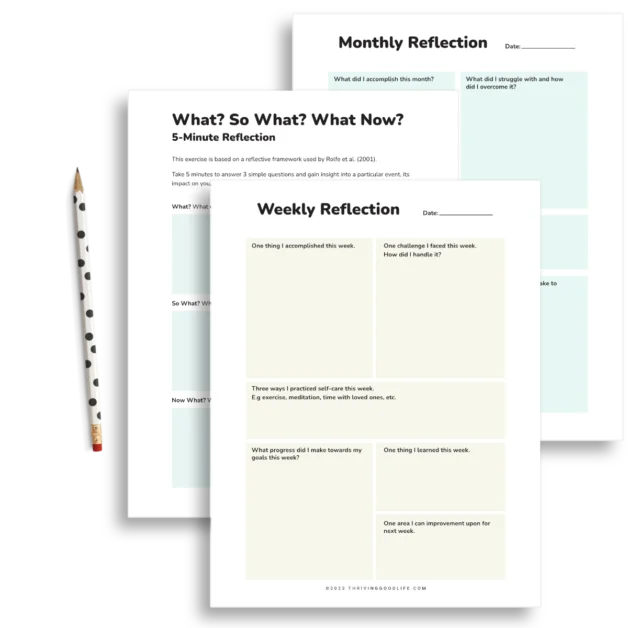
Get FREE journaling resources + templates
Sign up for instant access to a growing toolkit of PDF journaling pages, prompts, worksheets and more. PLUS bi-weekly journaling wisdom, encouragement and personal insight delivered straight to your inbox.
By signing up you agree to our T&Cs and Privacy Policy.
My Journaling Story
I toyed with journaling as a child, but it wasn’t long lasting or serious. An on-and-off type of thing. I was way too fearful of family members finding and reading my inner thoughts, so I never really delved too deep.
Fast forward some years later, and in the midst of grieving the loss of a significant relationship, I found myself questioning who I was and what I wanted for my life.
I found solace in my journal.
The loss – a lengthy separation followed by a nasty divorce. It hit me hard.
Of all the difficult emotions I felt during that breakup, the sadness was what consumed me the most.
It wasn’t the sobbing, wailing kind of sadness (although I did shed a few tears). Rather, it was a silent, heavy sadness that drained my spirit day after day.
Along with the sadness, I also felt deep shame about the failure of my marriage. I was embarrassed that despite my efforts, we couldn’t save our relationship. I was no longer someone’s wife; instead, I’d become the embodiment of a divorce statistic.
I needed to find peace with my situation to start moving forward, so I turned to journaling as a way to start processing my feelings and painful emotions.
While that breakup took so much out of me, it led to something invaluable. A new, and much-improved relationship with myself. And that, I owe to journaling.
For over 14 years, I’ve been documenting my experiences and reflections in notebooks. Here are a few areas where I’ve grown through my personal journaling journey:
These benefits are just the tip of the ice-berg.
Let’s just say that overall (although I am far from perfect), I’m a more mentally and emotionally stable, happier, healthier human being. And I dig that.
Does Journaling Benefit Everyone?
It would be remiss of me to say that journaling is the be all, end all solution to everyone’s problems. It depends on your current state of wellbeing.
Serious mental health or emotional issues like depression, anxiety or inner child wounds are complex, and may require the assistance of a qualified counsellor, therapist or trauma informed therapist. Under their supervision, they may suggest journaling as part of a broader care plan.
Just know that when you go digging into the depths of your psyche, you will unearth unsavoury memories that were buried. You have to ask yourself if you’re ready to resurface them.
Different Styles of Journaling
There are many ways to journal, but for the purpose of this article I’m going to focus on self-reflective journaling methods. Here are a few of the popular ones.
Gratitude Journaling
Practicing gratitude has real and lasting benefits for your mental health and overall well-being. 6
As humans, we’re very good at registering and dwelling on negative events and experiences, over positive ones.
We can’t help it. We’re wired that way. 7
But, we can flip our negativity bias on it’s head. By making a conscious effort to focus on the positive we can tap into our happy place.
HOW TO DO IT:
Take a few moments out of your day, or week to write about the things you feel grateful for. This could be your health, home, family, friends, pets, career, money, learning a new skill, alone time. Anything.
Some people like to journal at the end of the day, while others like to do it as soon as they wake up in the morning. It’s up to you.
Stream of Consciousness Journaling
This is called “stream of consciousness” because your thoughts flow from one thing to another without much order or reason.
Just like a river or stream.
You’ll also hear style be referred to as freewriting.
HOW TO DO IT:
Just write. Write anything that pops into your head at the time.
Maybe you start off reminiscing about a lovely evening with a friend… then all of a sudden you remember you forgot to feed the cat, and you still have dirty dishes in the sink, and you notice your tummy’s rumbling, but what should you eat?… OMG a cheese toasty with Worcester sauce on it … just like the one you had at your nan’s house last week…
Yes, it’s like verbal diarrhea, but in written form.
Don’t overthink or judge whatever it is you’re writing.
Allow yourself to spill all your thoughts and feelings onto paper.
You can set a timer for this exercise if you like, but that will interrupt your train of flow. Not ideal. You don’t want to be disturbed mid-flow.
Morning Pages
This form of journaling is often used by writers who struggle with writers block. It’s great for clearing the mind, while improving creative writing skills along the way. But it’s a great technique for anyone.
This is also a form of stream of consciousness journaling, but the idea behind this technique is that you have to journal in the morning, and write three pages of longhand. 8
HOW TO DO IT:
See stream of consciousness above.
One Line a Day Journaling
If time is an issue for you, this journaling method is one of the quickest and easiest ways to start and maintain a journaling habit.
HOW TO DO IT:
Every day, you write down one line in your journal.
You could write a quick one-sentence entry about how you’re feeling that day, how you slept the night before, what you are grateful for, or something you learned about yourself.
One line. That’s it.
Visual Art Journaling
If you prefer something a bit more creative, try this out for size.
Art journaling is a soothing technique that can help when dealing with stress and anxiety. 9 You can combine various art forms such as writing, doodling, drawing, photography, or collage to express your deepest thoughts, feelings, and emotions.
It’s also a lot of fun. And no, you don’t need to be an artist to try this.
HOW TO DO IT:
Find a large space (ideally a table, but the floor will do),and gather your art supplies. This could be paints, pencils, chalk, photos, glue, stickers, magazine cut-outs, newspapers, scissors/cutting tools etc.
Then, assemble the artwork in your journal.
Here’s some art journaling inspiration for you. ASMR style. Enjoy:
💡 Related Resource:
How to Start Journaling for Beginners
It all sounds nice, I hear you say, but how do you ACTUALLY start journaling if you’ve never journaled before.
Let’s break it down into five steps:
- Identify your reasons for journaling
- Chose your journal format
- Select your environment
- Start writing
Step 1: Identify Your Motivation
Why do you want to start journaling? And why now?
What are you hoping to achieve?
Is it for personal development, to be more grateful, have better relationships, to be more mindful, or to process emotional pain?
Unless you can identify why you want to start a journal, your attempts to put pen to paper will be a major struggle-fest.
And that’s bound to crush any enthusiasm, hope, or motivation you had for journaling. You’ll struggle to be consistent, and eventually, give up.
Journaling can work for you – if you let it.
So, figure out what you want from your journal. Get clear on that, and you’ll start to see journaling as the bridge drawing you closer to your desires.
It then stops being this task you have to make yourself do. Instead, it becomes an experience you look forward to because you get so much value out of it.
Here’s that question again… Why do you want to journal?
Take a moment to really think about it.
Write your answer down, then move on to step number two.
Step 2: Choose Your Journal
What type of journal should you use?
In a nutshell, use the type of journal that will work best for you.
Some people prefer using digital apps to keep their journals.
Others prefer paper.
I’m a paper gal when it comes to journaling.
I love the feel of gliding a pen across paper, and seeing the marks that I make. I’m both physically and emotionally connected to my journal.
Digital journaling doesn’t do it for me. I’m in no way a luddite (I freaking love technology). I just don’t always want to be ‘plugged in’.
For me to connect with and process deep thoughts and feelings, I need to do that AWAY from an electronic screen. No PC, iPad or smartphone.
A paper journal is my sanctuary in this respect. A momentary escape from the world of tech.
But I digress.
Ultimately, the best type of journal for you – is the one you’re going to actually use on a regular. Want to go digital? Do that. Paper? Go for it.
Either way you’ve got to like….
No, you’ve got to LOVE your journal enough to look forward to writing in it.
The rest of this article is going to refer to paper-based journaling, but most of the following can be applied to digital journaling too.
Things to Consider When Buying a Paper Journal:
Size.
Will you be carrying your journal around with you?
If that’s the case you want a notebook that’s not bulky and fits into a regular sized bag. An A5 hardback would be your best bet. It’s more durable than a paperback, or spiral bound journal, and is a decent size to write in.
If you won’t be lugging your journal around with you, a paperback or larger size journal could be a good option.
Paper type.
Should you choose a journal that has lined, blank, graph, or dot-grid paper?
The answer to that question, depends on how you intend to use it.
Do you have the kind of handwriting that’s unruly and needs guidance? You’re probably best with a lined journal.
Do you feel restricted by lines? Go for a blank paper type.
Although I like blank paper journals, I’ve given up on them. I can’t write in a straight line to save my life. I need evenly spaced guides to scrawl on.
Do you like to doodle, draw or paint, as well as write? Would you like to embellish your pages with cute stickers? If so, go for a journal with thicker quality paper that’s either blank or dot grid (that said, my current journal is lined and it doesn’t stop me from breaking out the odd doodle).
Price.
There are journal connoisseurs who think nothing of spending £40 on a fancy calfskin, hand-stitched leather journal.
I’ve even seen journals selling for upwards of £90.
Damn! If I have to take out three Klarna instalments just to pay for a journal with empty pages inside, then that journal is not for me.
Not at the rate I go through them.
You don’t have to go broke buying a journal.
Spend what you’re comfortable spending, but make sure the journal you pick is one you’ll actually write in. You want to use the thing, not confine it to that dusty pile of empty notebooks taking up space on your shelf.
Is it Really Okay to Use Journal Prompts?
Yes. It’s fine to use written prompts in your journal.
I mean, it’s better than staring at a blank page.
Plus prompts help you uncover deep thoughts, emotions, and feelings that you’ve buried. And help brainstorm ideas for areas you want to improve on.
Alternatively, buy a guided journal that has pre-written prompts in it.
Like this one:
Step 3: Choose Your Environment
Where ever you feel relaxed, comfortable and free to write your innermost thoughts, that’s your spot.
That could be your bedroom, living room, the garden shed… the toilet.
Some people like to journal under zen like conditions no distractions. While others prefer the ambiance of a coffee shop or library setting.
What’s more important is writing in the same environment each time. That way you’ll start to associate that space with your journaling practice. Which will help you develop a regular journal writing habit (we’ll get to this later).
When is the Right Time of Day to Journal?
The right time to journal is the time that best works for you.
Are you an early bird or a night owl?
Choose a time when you’ll feel the most energised to write. And once again, try to pick a time when you’re not likely to get interrupted.
For me, it’s first thing in the morning, because… well, zero distractions. I just can’t get my journaling head together at any other time of day.
What if You Struggle to Get Alone Time?
If you have kids, or pets that don’t seem to want to leave your side, I see you rolling your eyes at me right now. But hang in there. Here are a few ways to get the alone time you seek (from a mum of six).
If you’re really struggling with finding the right environment or time to journal, don’t beat yourself up over it. Sometimes, it doesn’t happen.
Accept the situation for what it is now. But look for opportunities to pursue journaling when you can create the space for it.
Step 4: Write Your First Journal Entry
Most people shy away from starting a journal because they don’t know what to write.
When it comes to that first page, they zone out. Or overthink it. Usually, because they’re trying too hard to write something profound or prolific.
The first blank page of anything is intimidating, but here’s how you get past that. You. Keep. It. Simple.
Start with the context. Write about general stuff.
Here are a few ideas to get you started:
- Are you about to start a new project, new job, move home?
- What are your journaling goals?
- Where are you in life right now?
- What’s working well? What’s not working well?
- How are you feeling about journaling in this moment – happy, skeptical, indifferent, worried?
- What are you grateful for?
- What do you want to improve or change?
- What do you want to learn – in general, and/or about yourself?
The main thing to remember is this… being open and honest in your journal is your superpower.
Your journal is a place where you can be yourself, and learn about the person you really are – in all your messy glory.
It would be a shame not to fully explore what’s going on with you.
Much like working with a therapist, your level of openness can help or hinder that relationship. They won’t be able to help you if they don’t know where you’re at, or where you want to go.
Nor will your journal my friend.
How Often Should You Write?
This is tricky because I want to tell you to write whenever you feel like it.
But the reality is this:
If you want to become a journaler, you need to make journaling a habit. And habits only come about when you do things consistently.
When I first started journaling, I wrote every day for three months straight. That’s what I needed to make journaling a permanent fixture in my life.
I went through a stage of sporadic journaling.
Sometimes I’d write daily for months on end. Then nothing for a week. Then I’d journal a few times a week. Then every day again.
Nowadays, I journal pretty much every day. I feel more connected to myself that way.
If you’re just starting out, I encourage you to go hard.
Aim to journal every day.
Once you’ve built your journaling muscle you’ll get into a natural writing rhythm that works for you.
Maybe you’ll continue to journal each day.
Or maybe you’ll find once or twice a week is enough.
How Much Should You Write?
Now, this depends on what mood you’re in when it comes to journaling. And of course, how much time you’ve got.
Some days, if I’ve woken up late or had a bad night’s sleep, I can only manage to muster a quick sentence.
Other days, I’m spitting out six pages of word vomit.
I’ve tried the morning pages method of journaling, but I’m not good with following rules. And having to write three pages every day, kind of sucked the life out of me.
I didn’t like feeling guilty for not reaching my daily journaling quota on days where the energy just wasn’t there. So, I stopped trying to hit three pages and did my own thing.
My advice: go with the flow. Listen to what you’re feeling, and how much time you have, and act according to that.
The most important thing is that you’re writing something. It doesn’t have to be a lot if you don’t have the capacity for it.
Should You Review Your Journal?
Some people review their journal every day.
Some, every week, month, or year.
Others review their journal during specific seasons in their lives.
Some people don’t review their journal at all.
Whether you review your journal depends on what you’re using it for.
Journaling for self-improvement? Got goals you want to track? Then it makes sense to want to review your journal from time to time because that’s a good way to measure your growth.
If you’re writing as a way to heal emotional wounds, you may not want to revisit what you’ve written.
In this case, the simple act of venting, then letting go is enough.
Ask yourself, what would be the benefit of reviewing painful journal entries after you’ve grown, and healed from those episodes?
5 Tips for Consistent Journaling
One of the biggest problems people have with journaling is inconsistency. They write something one day and then go weeks or months without writing anything.
While you can get away with journaling this way if you’re an established journaler, you’ll struggle if you’re just starting out. As a beginner, this lack of consistency is likely to lead to downfall.
Why? Because you’ve not yet internalised the practice of journaling.
I’ve been journaling for so long now, that if I miss a week it doesn’t have any negative impact on me. I understand the ebbs and flows of my journaling process and accept that for what it is.
That said, it feels unnatural for me to go too long without writing in my journal. And I don’t see a time when I would ever just stop.
As a beginner, skipped journaling sessions may feel like failure. You might kick yourself for not sticking to the program. And then question whether journaling is for you.
So, if you have trouble keeping a journal, below are a few tips that may help.
💡 Related Resource:
1. Remember Why You’re Journaling
Chances are you’re using your journal to support your well-being in some way. It may feel difficult now, but your future self will thank you for the effort you’ve made.
Keep that in mind, and journal for that version of you.
2. Use Journaling Prompts
These can be anything — questions, words, or sentences — that give you direction when you start writing.
You don’t need to stick with the prompts, or even answer them fully. The goal here is to use these prompts as inspiration when you don’t know what to write about.
3. Make it Easy to Access
Imagine for a second, your neighbour drops off a batch of freshly-baked chocolate chip cookies. You leave the plate of steaming goodies on your kitchen counter.
What happens the next time you walk into your kitchen?
You see the plate of mouth-watering snacks staring you square in the eye. Softly whispering: ‘eat me’. If you’re like the 1.3781 billion sugar addicts on Earth, you’re going to want to reach for one? Am I right?
Now replace the cookies for your journal (I know, not as tempting).
But, you’ve had a hard day at work and your mind is buzzing with thoughts. Out of the corner of your eye, you spy your journal. You know that would be a good place to offload, and so you pick it up…
Try to get into the habit of leaving your journal somewhere in plain sight. Maybe on your bedside table. Or the kitchen counter. When you can see and access your journal easily, that’ll be your cue to pick it up.
4. Dedicate Time to Journal
Physically schedule that time in a planner or calendar, then follow through. If you think you’re likely to forget to journal, set yourself a reminder.
5. Go For the Lowest Common Denominator
So you don’t feel like writing a page in your journal today. That’s okay, because you don’t have to. Write a sentence instead.
Don’t want to write a sentence? Okay, then write a word.
One. Single. Word. Something that expresses how you’re feeling in that moment, or sums up the entirety of your day:
- ‘Exhausted’
- ‘Excited’
- ‘Bewildered’
This way, you won’t feel like a flake for not abiding to your journaling routine. You may even surprise yourself and end up writing more than you thought you would.
6. Track Your Progress
One way to make your journaling habits sticky, is to track them.
With a habit tracker.
This will help you focus on getting your journaling done.
It’ll also give you little butterfly’s in your tummy when you see all the progress you’ve made each week (or month).
Okay, maybe butterflies is a stretch.
But you’ll feel like a more accomplished journaler. And you’ll want to keep that winning streak going. Because progress on a habit tracker looks great when you’ve checked off all the boxes.
And not so great when you can see the days you’ve skipped.
So, keep yourself accountable and use a habit tracking template.
Attach it to something you use daily, like the fridge or a planner.
(Join the resource hub – you’ll be able to download a habit tracking template and more 👇🏾 )

Get FREE journaling resources + templates
Sign up for instant access to a growing toolkit of PDF journaling pages, prompts, worksheets and more. PLUS bi-weekly journaling wisdom, encouragement and personal insight delivered straight to your inbox.
By signing up you agree to our T&Cs and Privacy Policy.
5 Common Obstacles to Journaling
So, now you’ve read all these tips to start journaling, you’re good.
Just pick up your journal, and get to writing…
Yeah, I wish I could tell you that it’ll be smooth sailing from here on.
But, I’d be lying. Because journaling is simple, but it isn’t easy. It can bring a heap of goodness into your life, but there will be struggle. And you’ll be tempted to quit (or just not start at all).
And I don’t want that for you.
So, I’m going to share a few roadblocks you might encounter on your journaling journey. And what you can do to swerve or minimise them.
1. Getting Terrible Writer’s Block
This is not a sign that you should give up journaling. Chances are you’re experiencing empty brain syndrome, and you’re panicking. And in doing so, simultaneously putting more pressure on yourself to perform. It happens. Even to great writers. Fortunately, it’s temporary.
WHAT TO DO ABOUT IT:
Don’t beat yourself up over it.
Know that anything you write is progress, even if it seems like gibberish.
Allow yourself to write that gibberish and be okay with it (because no one else is going to see it other than you, right?)
Alternatively, find a few journal prompts and go to town on those.
Here are a few of my tried and tested empty brain busters:
- What went well today?
- What didn’t go so well?
- What do I need to do to make tomorrow better than today?
Sometimes I’ll even write about me not wanting to write.
A quick entry like:
‘I don’t feel like writing today, and that’s okay. There’s always tomorrow’.
2. Struggling to Find Time
Or at least that’s the story you’ll tell yourself. The reality is this: We make time for the things we want to do in life.
WHAT TO DO ABOUT IT:
Get super honest with yourself, and answer this question:
“Do I really not have 5 minutes in a day, or week to write a couple of lines in my journal? Or, am I trying to avoid it.”
If you are trying to avoid your journal, there’s no shame in that. But get curious about what’s really going on.
Because more often than not, you’ll see that time (or a perceived lack of time) is not the issue.
Let’s be real. If you want to start journaling you need to make space for it. And if you can’t carve out a smidgen of time, you’re not really ready to journal. Not right now. But maybe in the future.
If you are ready, take inventory of the things in your life that you’re currently prioritising, and be prepared to make a little sacrifice.
Here’s another question to ask yourself:
“What can I do less of in my day, or week to make time for journaling?”
Maybe that’s watching 5 minutes less of TV, going to bed or waking up 5 minutes earlier, or saying no to mindless phone scrolling.
We have 24 hours in a day. You get to decide where you invest it.
3. Skipping a Day (or Longer) Then Feeling Bad
This is the reason why so many of us give up when trying to install a new diet, or exercise regimen into our lives. We have everything mapped out in our heads, maybe even on paper.
We’re so determined we’re going to stick with the plan, no matter what.
Then it happens. We skip a day.
And then another. Followed by yet another.
We start feeling bad about all these skipped days and decide that the diet/exercise thing isn’t going to work.
Depending on the relationship you have with journaling, a string of skipped sessions can make you feel just as bad. You view the lack of consistency as failure, and conclude that journaling isn’t for you.
This is all-or-nothing thinking. 10 Don’t allow it to ruin a good thing.
WHAT TO DO ABOUT IT:
If you do miss a few days (and it’s inevitable that you will), don’t freak out. This doesn’t mean your journaling journey is doomed to failure. It’s just a minor blip. And as long as you jump back on the saddle, you’re all good.
Forgive yourself for that missed day, or three, and move on.
It might help to set a three-strike rule. Make a pact with yourself never to skip more than three days in a row.
It doesn’t have to be set to three days. It could be four, or five, or seven. Whatever timeframe feels comfortable for you.
4. Worrying Someone Will Read it
You’re about to pour your thoughts, feelings, and emotions into your journal, but then you stop. A horrifying thought crosses your mind:
“What if someone reads this one day?”
Well, chances are that that could happen.
It’s the reason why, as a kid I fantasised about keeping a secret diary. Just like the fictional character Adrian Mole.
I tried, but it was mostly a huge fail. Because, well…
I grew up with brothers. I didn’t trust them to not read it.
Any journal-keeping would have been an open invitation for my siblings to tease me chronic. Then share their discoveries with their friends. As the eldest, most responsible one, I couldn’t take that risk.
Even when you move into adulthood, and are hopefully living with people you can trust – a partner, or flatmates, there’s still that 0.02154 chance that someone could read it. A visiting relative who likes to snoop, perhaps.
And what happens when you’re six-feet under?
Someone’s bound to read it then, right?
These concerns are real. They’re valid, and I hear you.
But I hope this isn’t the reason you stop (or never start) journaling.
WHAT TO DO ABOUT IT:
Assess your current situation
If you’re in an environment where the discovery of a physical journal could put you at risk of harm, or retaliation, keeping a physical journal may not be the best option.
It breaks my heart to say that, but your safety is way more important.
Digital journaling may be the way to go if you have control over your passwords, but consider waiting until you’re in a safer environment.
And seek support from a close friend or professional who can help.
The following tips are applicable where there is no threat of personal danger:
Be explicit about your need for privacy
It’s unacceptable for anyone to read your personal journal without consent. You have every right to ask people to respect privacy.
Here’s a handy script to help you have that conversation, either in person or via email. Use it as-is, or adapt as required:
“Hey, I want to let you know that my journal is really personal to me and I consider it private. I write in it to process my thoughts and work on understanding myself better. I’m asking you to please not read my journal without my permission. This isn’t about me not trusting you – it’s about my need to express myself freely without worrying about what others will think. If I ever feel comfortable sharing parts of my journal, I’ll open up about that. But for now, I’m asking for you to respect my privacy around my journal writing. I hope you can understand where I’m coming from. Your support with this means a lot to me.”
Setting that boundary upfront takes away any ambiguity and shows this is non-negotiable for you. It makes it uncomfortable for any human being with an ounce of decency to even think about crossing that line.
Keep an online digital journal
While I’m not still 100% convinced there are no privacy issues with journaling apps, the chances of your nearest and dearest accessing your journal are slim to none.
Just make sure you have the securest password, proper encryption and some kind of two-factor authentication going on.
Burn your journal once you’ve written it
Ack, it’s extreme, and I could never bring myself to do this. Only you can decide whether this is the right move for you.
But, before you consider this option, think carefully about whether you’ll regret your actions later.
Write in a language that only you can decode
If you have the time and patience, you could encrypt certain entries with secret codes, ciphers or shorthand.
A snooper is going to have to work hard to figure out what you wrote. Chances are, if they aren’t into cracking codes they’ll sit your journal right back down again.
Don’t use real names
If some unauthorised entity does read your journal, they won’t know who you’re referring to. Yes they’ll still be curious, but it could lessen any drama or embarrassment around outing someone you didn’t intend to expose.
I try not to drop names. Maybe an initial. No gender references.
But what if someone figures out the entry was about them? Well:
(a) they’ll learn something about themselves and,
(b) they’d learn something about you.
If they have the audacity to be offended by your private thoughts from the past, then that’s their issue to deal with. Not yours.
Let them stay offended. They had no business reading your journal anyway.
Be honest but remain abstract
If I write about something deeply personal that I don’t want others to know about, I focus on my feelings at the time, the lessons learned, changes I need to make. Not on any specific person or people involved in the story.
I try to write with just enough background information for me to remember the actual event. It’s not enough for anyone to know the full ins and outs.
If all else fails, accept that someone may read your journal one day
Make peace with expressing yourself on paper.
We can hope no one reads the messy parts of our innermost thoughts without our consent (well, at least not while we’re still alive).
But if they do, the guilt and shame of breaking our trust is on the snooper. It’s not on us.
When we look at the benefits of journaling, we have to weigh up what matters most. A nosy fecker, who has no business rummaging through our stuff in the first place, or… an outlet for personal growth and wellbeing.
4. Obsessing Over Neatness
Let me tell you, my journal is a hot mess.
There are times I can’t even read what I’ve written. I cross things out. I misspell basic words. I sometimes write the wrong date.
Yeah, it’s annoying.
Every so often I catch myself wistfully looking at beautiful journal spreads on Pinterest and wishing my handwriting was that neat.
And then I remember why I’m journaling.
For me my journal isn’t about striving for aesthetic perfection.
My journal is a tool that helps me better understand myself and my relationships, and grow from my experiences.
The neatness of your journal isn’t all that important. Not if you’re using it for self-reflection and personal growth.
WHAT TO DO ABOUT IT:
Embrace the messiness of your journal and let the content serve its purpose.
6. Waiting for the Right Time to Start
A friend once told me that she wanted to start journaling, but the time wasn’t right. She was waiting for her kids to get older. Then she’d have more time. All I could think of was all those childhood memories that were going to go uncaptured.
The right time to start a journal is now.
Even if life is chaotic and messy.
Even if you’re going through a season of change.
Even if you’re juggling this, that, and the other.
It’s during these times you need your journal more than ever.
WHAT TO DO ABOUT IT:
Start your journal. Like, today.
— Was This Article Helpful? Pin it For Future Reference —
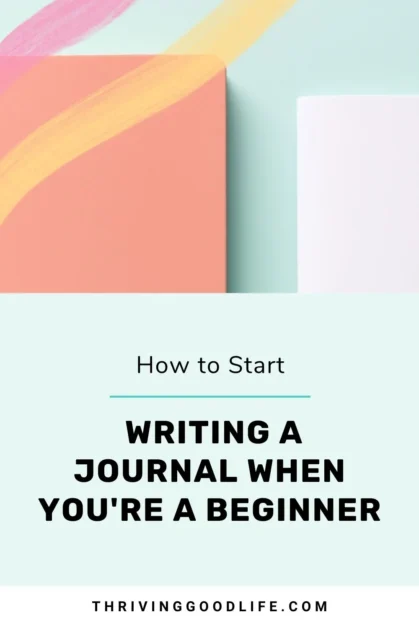
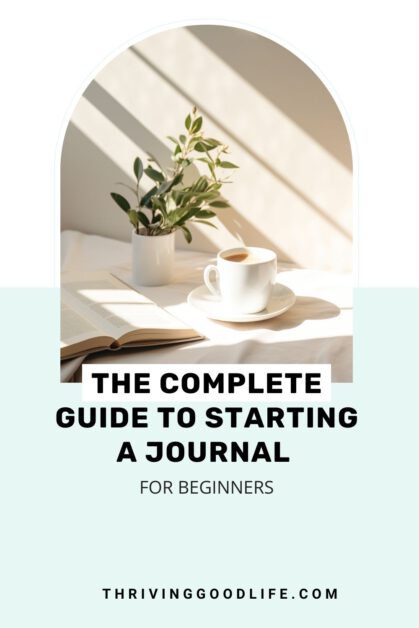
Footnotes
- Joplin, J. (2000). The therapeutic benefits of expressive writing. The Academy of Management Executive (1993-2005), 14(2), 124–125.
- Long, J. J., & Davis, J. O. (2011). Pen and paper: A prescription for adolescents’ emotional and psychological well being? Journal of Correctional Education, 62(1), 7–25.
- Pennebaker, J. W. (1997). Writing about emotional experiences as a therapeutic process. Psychological Science, 8(3), 162–166. https://www.jstor.org/stable/40063169
- Spera, S. P., Buhrfeind, E. D., & Pennebaker, J. W. (1994). Expressive writing and coping with job loss. Academy of Management Journal, 37(3), 722–733.
- Ashbury, J., Fletcher, B., & Birtwhistle, R. (1993). Personal journal writing in a communication skills course for first‐year medical students. Medical Education, 27. https://doi.org/10.1111/J.1365-2923.1993.TB00257.X.
- Wood, A. M., Froh, J. J., & Geraghty, A. W. A. (2010). Gratitude and well-being: A review and theoretical integration. Clinical Psychology Review, 30(7), 890–905.
- Rozin, P., & Royzman, E. B. (2001). Negativity bias, negativity dominance, and contagion. Personality and Social Psychology Review, 5(4), 296–320.
- Not my rules, but the rules of Julia Cameron, the creator of this method: Cameron, J. (2017, September 18). Morning pages: FAQ | Julia Cameron Live.
- Mercer, A., Warson, E., & Zhao, J. (2010). Visual journaling: An intervention to influence stress, anxiety and affect levels in medical students. The Arts in Psychotherapy, 37(2), 143–148.
- Tartakovsky, M. (2015). 5 Ways to Expand All-or-Nothing Thinking. Psych Central.
